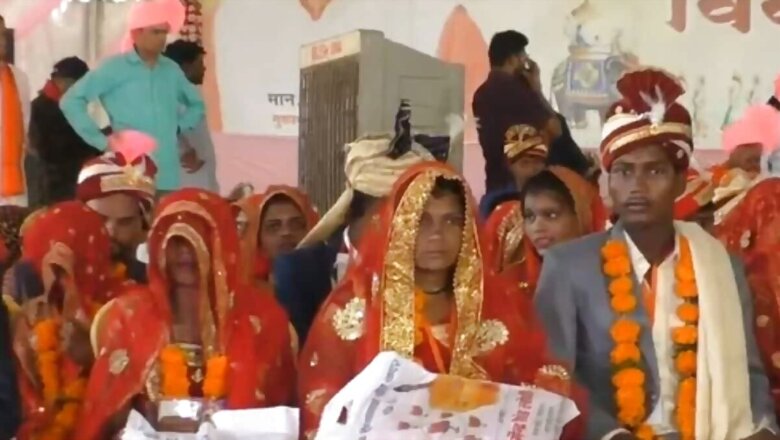
views
A mass marriage ceremony was held at the Tendukheda Krishi Upaj Mandi Center in Damoh district, Madhya Pradesh under the Mukhyamantri Kanya Vivaah Yojana. During this event, 1700 couples were married.
The news of the mass marriage spread quickly, attracting many couples to the Krishi Upaj Mandi Kendra. Minister Dharmendra Singh Lodhi instructed the registration of 271 additional couples. District Panchayat CEO Manish Bagri swiftly registered these couples and proceeded with the marriage ceremony. The minister performed the ritual of pakadua.
This scheme aims to marry off daughters from poor and capable families, securing their future. Under Mukhyamantri Kanya Vivaah Yojana, the Madhya Pradesh government organized the mass marriage of about 1971 couples at the Tendukheda Krishi Upaj Mandi. Minister Dharmendra Singh Lodhi and his wife performed the traditional ritual of washing the brides’ feet as per Indian culture and Hindu customs.
An additional vow was taken after the seven traditional vows; the ceremony included two main objectives. The first was to unite the bride and groom, and the second was to provide each couple with a fruit-bearing plant, which they vowed to care for. State government minister Dharmendra Singh Lodhi, the chief guest, explained the importance of preserving cultural traditions, explaining that he and his wife washed the feet of newlywed couples to honour these customs.
According to the department, since 2012, more than 116 lakh beneficiaries have received the benefits of the Mukhyamantri Kanya Vivaah Yojana. The department has also decided to increase the publicity of this scheme. All officers have been instructed to promote the benefits of this scheme in every village, ensuring that more people can benefit from it.
The Mukhyamantri Kanya Vivaah Yojana, which began in 2007, aims to provide financial assistance to poor families during marriage, encourage marriage registration, promote girl education, and prevent child marriage. Under this scheme, families living below the poverty line (BPL) and others with an annual income of up to Rs 60,000 receive Rs 5,000 at the time of marriage. Initially, funds were allocated to the Block Development Officer and disbursed at the block level. Since 2012, applications for the scheme have been processed through RTPS.


















Comments
0 comment